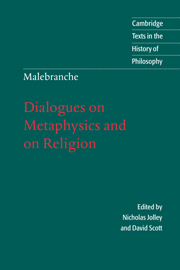Book contents
- Frontmatter
- Contents
- Acknowledgments
- List of abbreviations
- Introduction
- Chronology
- Further reading
- Note on the text
- Dialogues on Metaphysics and on Religion
- Dialogue I
- Dialogue II
- Dialogue III
- Dialogue IV
- Dialogue V
- Dialogue VI
- Dialogue VII
- Dialogue VIII
- Dialogue IX
- Dialogue X
- Dialogue XI
- Dialogue XII
- Dialogue XIII
- Dialogue XIV
- Index
- Cambridge texts in the history of philosophy
Dialogue IV
Published online by Cambridge University Press: 05 June 2012
- Frontmatter
- Contents
- Acknowledgments
- List of abbreviations
- Introduction
- Chronology
- Further reading
- Note on the text
- Dialogues on Metaphysics and on Religion
- Dialogue I
- Dialogue II
- Dialogue III
- Dialogue IV
- Dialogue V
- Dialogue VI
- Dialogue VII
- Dialogue VIII
- Dialogue IX
- Dialogue X
- Dialogue XI
- Dialogue XII
- Dialogue XIII
- Dialogue XIV
- Index
- Cambridge texts in the history of philosophy
Summary
The nature and properties of the senses in general. The wisdom of the laws of the union of the soul and body. This union changed into dependence by the sin of the first man.
ARISTES. Where are you coming from, Theodore? I was getting impatient not meeting you.
I. THEODORE. What! Is Reason not sufficient for you, and are you unable to pass the time agreeably with it, if Theodore is not present? To blessed intellects Reason suffices for an eternity; and although I have left you with it for only several hours, impatience at not seeing me overtakes you. What are you thinking of? Do you expect me to allow you to have a blind and unrestrained attachment to me? Love Reason, consult it, follow it. For I declare to you that I renounce the friendship of those who neglect it and refuse to submit to its laws.
ARISTES. Gently, Theodore. Listen a moment.
II. THEODORE. There cannot be a lasting and sincere friendship unless it is based on Reason, on an immutable good, on a good everyone can possess without dividing it. For friendships founded on goods which are divisive and dissipate with use always have unfortunate consequences and last only a short while. Are these not false and dangerous friendships?
ARISTES. I agree. All that is true, nothing is more certain. Ah, Theodore!
THEODORE. What do you want to say?
- Type
- Chapter
- Information
- Malebranche: Dialogues on Metaphysics and on Religion , pp. 51 - 70Publisher: Cambridge University PressPrint publication year: 1997

